Can’t help it. Don’t feel guilty. Watched the Beverly Hills Housewives Reunion… twice.
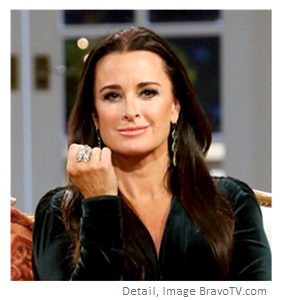 They’re fighting. They’re fuming. They’re fussing. And that was just Part 1. But what do I notice?
They’re fighting. They’re fuming. They’re fussing. And that was just Part 1. But what do I notice?
Their foreheads don’t move.
Now, I will say that Andy Cohen raises his brows and there’s interest, there’s curiosity, there’s expression. It’s fantastic!
It’s real. Real real!
Likewise, to a small degree, there’s a glimmer of movement on Kyle Richards and ditto, Brandi Glanville.
And hey, I get it! I’m a woman in a culture that worships youth and beauty by increasingly narrow standards. I can’t imagine how I’d feel or what I’d do if I was constantly in the limelight – not to mention the subject of criticism as to my every, um… move.
Then again, these women chose the spotlight – or more precisely – the magnifying glass. Does that spur them to excesses that I can’t imagine, in a Land of Excess that I also can’t imagine?
Guilty No More About Housewife Habits
As it is, I’m content to have Psychology Today’s refreshing justification to not feel guilty while watching this show – more on that in a moment. I nonetheless find that my ogling factor has gone into overdrive.
Was there a Botox Bonanza on Mojitos and Manhattans just before filming the Reunion Round 1?
Are you raising an eyebrow at that? And while doing so, can you feel the muscles move?
Brow Beaten
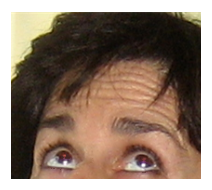 Listen. I’m all for taking care of ourselves, and that includes men and women. I’m all for deciding what level of care is involved, understanding our limitations (and expectations) vary with health, lifestyle, budget, career, even marital status. Ultimately we each have to live with ourselves, and theoretically, those who live with us have to, well… live with us.
Listen. I’m all for taking care of ourselves, and that includes men and women. I’m all for deciding what level of care is involved, understanding our limitations (and expectations) vary with health, lifestyle, budget, career, even marital status. Ultimately we each have to live with ourselves, and theoretically, those who live with us have to, well… live with us.
But really – is this so bad? Seeing a look of surprise that looks like surprise? A forehead filled with fury, fun, or furtive fancy?
Thank You, Psychology Today
That Good Psychology Seal of Approval I allude to? It’s this, by Dr. Melanie Greenberg: “Why We Can’t Stop Watching ‘The Real Housewives‘” – and happily, Dr. Greenberg gives us permission – by way of explanation – for our lurid fascination with these women in particular and the Housewives in general, as she recognizes redemption in our reality TV titillation.
Would the superficial shenanigans of these privileged, Botoxed divas kill brain neurons or lead me to be ostracized by my Ph.D. peers? Therefore, I was surprised (and secretly, delighted) to find out that I’m not alone among my intellectual counterparts in watching this pink, frilly eye candy.
Phew!
Peeking Through The Window
Dr. Greenberg chalks it up to voyeurism, envy, celebrity worship. Then there’s sex, there’s revenge, and there’s so much more…
There’s the narcissism of conspicuous consumption and wanting to be in the spotlight. And there’s the fact that what you see is a manufactured reality, carefully edited and spliced together around themes scripted by the producers.
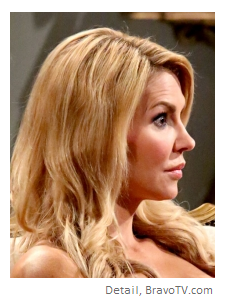 What else? It’s entertainment!
What else? It’s entertainment!
Still, those foreheads. They’re disturbing.
And no – this isn’t about picking on women over looks – in fact, on the contrary. I’d like us focused on women’s accomplishments, women living more fully, and axing the aging angst altogether – if possible.
Tripping the Plastic Fantastic?
But I would like not to be distracted by plasticity. I for one would enjoy the engagement of the players’ emotions with more than a jaw drop or a raised voice. You know. Actual action above the brow.
And there’s plenty to provoke the furrowing, the frowning, the flabbergasted floundering of the sort many of us can relate to – despite the disparity in surroundings and bank accounts.
Concerns for kids (or sisters).
Relationship rumors (and exiting spouses).
Surprises. Temptations. Celebrations.
Laugh Lines, Worry Lines
Brandi’s fine lines, able to be seen by the television viewer?
Big relief. Makes me like her!
The less than lifelike alternatives, and the culture that somehow expects this – or conditions us to be less than happy with even the tiniest twinges of an expressive face?
How did we get here? Why do we think this is okay?
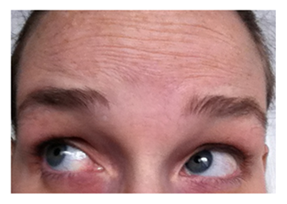 And I like seeing Andy’s face move – the mischief, the approval, the befuddlement, the concentration.
And I like seeing Andy’s face move – the mischief, the approval, the befuddlement, the concentration.
Real Foreheads! Let’s Start a “Movement!”
So here are a few foreheads. Aren’t they fabulous – even for those of you who don’t say “fabulous?”
I think they’re cool. I think they’re beautiful. I think they’re human and inviting and intriguing.
What if we allowed ourselves to focus on what we say and do, expressing our emotions – as is natural – and enjoying each moment? Wouldn’t that be something?
Is that a yes? A no?
As Andy Cohen would say – Tweet me! (At @RealForeheads!)
Real Housewives, Real Lives
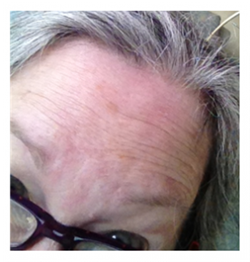 The thing is – I kind of like these women we see on television. No, not all of them. And yes, I know it’s scripted-shaped-edited-torqued-faked-finessed and all to keep us watching.
The thing is – I kind of like these women we see on television. No, not all of them. And yes, I know it’s scripted-shaped-edited-torqued-faked-finessed and all to keep us watching.
But aren’t most lives filled with stories we can relate to, or at least learn from? Aren’t human beings fascinating? Wouldn’t we love to truly understand the quality and longevity of the Vanderpump-Todd marriage – 30 years strong and still going?
Beneath the Fashioned For Television Consumption version of what we see, behind the Observation Factor, the Narcissism Epidemic, the complexities of family life that we can all comprehend – I’ll bet there are lessons – ones we could learn from.
And lessons leave traces.
Movement… Forward
I’d love for us to embrace our movement, and our movement forward. I grant it’s been a week of contemplating my own mortality, staring myself down in the mirror, digging deep for my feelings on growing older, and reflecting on myself in many ways – certainly not the sole dominion of the physical I see in the glass.
Isn’t life a gift? Not without bumps and bruises, but a gift all the same?
As for those immovable spans of skin?
Sure. I’ll still watch Beverly Hills, and Orange Country, and even Atlanta. But my forehead moves, and I’m glad.
Faces Tell Our Stories
Our faces and bodies tell our stories. My forehead surely shows the signs of a few of mine.
And so does Kristen’s. (Thank you, Kristen. Pop by and visit her amazing blog here.) And so does Walker’s. (Thank you, Walker. Visit her fantastic blog here.)
Listen. I fully understand the discomfort as we see signs of youth departing. But when did the pressure become so great that we as women feel like so much “less” as a result?
What about you? Does your face recount your stories? Do the crinkles at the corners of your eyes speak of laughter? How do you feel about a lined forehead? How do we make it “okay” for women to “be” at any age without feeling compelled to submit to the needle or the knife?
Kyle Richards and Brandi Glanville images, Details, BravoTV.com – click here for originals.
Andy Cohen, BravoTV.com – click here for original.
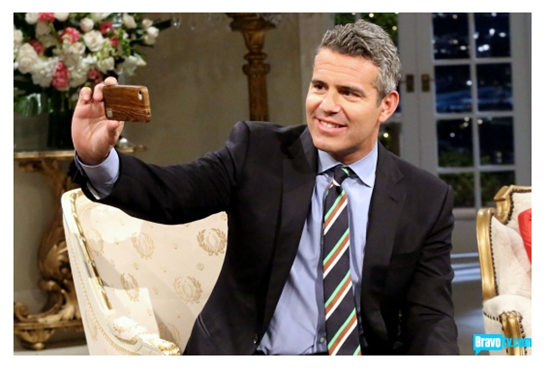
I hear ya. I too love to watch those ladies go at it, but I do all my watching on the airplane, when they have my undivided (and wrinkled) attention. I have to say that I don’t mind their plasticity–more power to them. I grew up in a home with a mother who was a cosmetician, so I believe, “If you don’t like it, change it.” Doesn’t mean you are unhappy with the rest of what’s going on in your life, or with yourself as a person, etc., etc. I hate the non-elasticity in their heads–that’s what gets me.
Oh, Mindy – You make me chuckle!
I don’t know. I’ve never seen the show, and I’ve never gone in for injections myself but calling women out for what they choose to do to their bodies and deeming it not okay (“Why do we think this is okay?”) because their choice isn’t one you’d make or one you find aesthetically pleasing and then moralizing about your decision is nothing more than body-policing which feeds into the destructive notion that a woman’s primary function is decorative.
That’s the insidious thing about living in a sexist culture. We internalize it and absorb it without even realizing it. Even as we question the possible destructive nature of the culture that created the “need” for these women to feel like they have to chase the fountain of youth, we still see them through the male gaze and punish them (disapproval is a punishment in any gregarious mammalian society) for not conforming to what you or I think is “healthy” and “normal” (i.e., what you are.)
Even women who wouldn’t DREAM of telling a woman she doesn’t have the right to, say, make her own reproductive decisions can fall prey to treating women’s bodies –celebrities or not– as a public commodity over which we all have cultural access, because that’s what we’re used to. Unfortunately, just because we’re used to it doesn’t mean it’s right or okay.
I’m not calling you out as some sort of sexist villain, you’re clearly not. I’m just inviting you to give some thought over the greater implications of what you’re actually doing when you participate in the age-old group sport of judging a woman for her looks and for exercising agency when it comes to choosing what’s right for her own body.
Someone had to call me out on doing the same thing years ago, and I’m forever grateful. I’m just trying to pay it forward and do you a solid while we’re at it.
Thanks for reading and commenting, Rhiannon. And I understand what you’re saying. I think if you’ve read here before, you know I try to remind us all – myself included – not to judge. We do it easily, women especially.
And I am calling us out – to some degree. Or rather, calling us out to stop and think, because individual decisions have a significant collective impact. The “playing field” is no longer level but worse, our perceptions of what is usual or normal (or words of your choice) are altered when it comes to the perpetual poking, primping and procedures that we avail ourselves of – and in my opinion, not for the better.
(For that matter, I feel the same way about photoshopping.)
The fact that women feel we must look ever youthful or ever “something” seems sexist and ageist to me, and a slow drain on our value and our skills.
Then again, I readily admit that I wear makeup – just as an example. Obviously, I care how I look. I don’t want someone telling me I shouldn’t wear makeup, so I get your point. But…
While I agree entirely that no one has a right to tell another person what to do (I exempt parents-kids), I would like us all to consider carefully what we now take for granted as commonplace – for our women. Not a good direction, in my opinion. And what each of us chooses does, indeed, affect the rest of us precisely because it does add to the pressure to look a certain way – especially when that’s what is presented in the media – whether it’s foreheads or boobs or butts or a certain body size or type.
Please stop back again. I hope even if we agree to disagree that we’ll do so amicably. And I do understand your point. Judge not, lest… etc, etc.
BLW and Rhiannon I have to judge the participants, producers and media distributors of such “reality” garbage. There has been a huge jump in reality shows and the coinciding decline in game shows and talk shows over the last 20 years, especially in the last 10 years. The reality shows are discussed in magazines, newspapers, talk shows and on the internet. They are largely directed to a female audience. This and the content should be offensive to women, but for some reason it is not.
This “reality” TV has some facsimile of reality but is really quite scripted, guided and refined. It has lots of drama and caricatures of humans, especially women to engage the viewers. Unfortunately it seems to be like professional wrestling where many believe it is real or watch it so much, that realizing it is not real that there are many real aspects, which is not in fact true.
What does it teach people, especially girls and young women:
1. girl gossiping is normal and acceptable,
2. girls are catty and competitive by nature,
3. you can’t trust other girls,
4. fighting is normal in a romantic relationship,
5. it’s okay to treat others poorly,
6. lying and manipulation to get what you want is acceptable,
7. being mean and bad gets you respect, not being nice,
8. acting and believing life is all about you is acceptable,
9. you have to be mean to get what you want,
10 physical beauty is more important and outweighs inner beauty, intelligence, character and good actions combined,
11. men solely or primarily value physical beauty,
12. physical beauty leads to happiness, wealth and success,
13. narcissistic behaviour is normal and acceptable,
14. physical beauty is worth taking medical risks and the cost to influence or manipulate men to get what you want instead of getting what you want on your own or any consideration to the type of man you will attract.
All these shows have is high and multiple incidents of drama that often are related to humiliation, embarrassment or painful events. Stereotypes of all kinds seem to be reinforced and used as a form of entertainment. What does that teach girls and young women who seemingly have or need to have more drama in their life? Some psychologists suggest reality makes us more aggressive.
Then there is the issue of humilitainment:
“Humilitainment
Waite and Booker call this phenomenon “humilitainment,” the tendency for viewers to be attracted to spectacular mortification. Since their study, similarly indecorous shows have popped up like pockmarks on the genre. “Temptation Island” placed dating couples on opposite ends of an island resort and introduced tempters and temptresses whose main purpose, it seems, was to initiate philandering while wearing as little clothing as possible. Some titles alone are enough to evoke disgust: “I Want a Famous Face,” “Trading Spouses: Meet Your New Mommy,” “The Virgin,” and the ever-popular font of humiliation: “Who’s Your Daddy?”
Humilitainment has a more graceful and precise cousin — the German word schadenfreude, which translates to the pleasure one receives at the suffering of others. Colin Wayne Leach and Russell Spears studied schadenfreude as it related to an even more real type of reality contest — World Cup soccer matches. Looking at soccer fans’ reactions to their team’s losses and rival team’s victories, Leach and Spears found that schadenfreude was the result of threatened inferiority. In the wake of losing a competition, schadenfreude is “a covert form of prejudice that is used in the maintenance of self-worth,” the authors wrote in the Journal of Personality and Social Psychology.
If reality viewers are in fact tuning in to feel better at another person’s expense, Waite predicts a maladaptive future for heavy watchers. “They expect it’s OK to humiliate and to be humiliated by others, instead of thinking there’s something wrong with this behavior,” Waite said. “The world they’re living in is different from others.” In this world according to Waite, the borders separating on-screen from off-screen blend indistinguishably. It is this seamless convergence of fiction and reality that psychologists fear could have a severe behavioral impact.”
http://www.psychologicalscience.org/index.php/publications/observer/2005/march-05/reality-check.html
As for the young women on these shows with their cosmetic surgery, they act for personal and pecuniary gain. They do not care about the effect they have on young women and in fact are complicit in making a certain level of beauty the standard, regardless of whether it is attainable for most or sustainable by any. Further they compromise “normal” behaviour and set a ridiculous example for behaviour by women. This false “reality” does far more damage than their nip and tuck maximization of female beauty. Dr Julie Albright, psychology prof at the University USC, wrote a study indicating that women who watch reality shows with plastic surgery participants are more anxious about their bodies and more likely to see their ‘problem’ body parts as a moral failing.
So, yes, I judge.
What a thorough and well conceived response, Curtis. Thank you for this. So much to consider.
And we all judge. Maybe that isn’t always a bad thing.
It seems society is moving in this direction of perfection by modification. A friend of mine send me these two disturbing links:
According to the American Society of Plastic and Reconstructive Surgeons (ASPS), more than 219,000 cosmetic procedures were done on patients aged 18 and younger in 2008.
http://teens.webmd.com/teens-plastic-surgery?page=2
I have also heard of boob and nose jobs for High School grad presents (which I find disturbing) but to take matters to the wacky ultimate extreme a UK mother gave her 7 year old a voucher for a boob job when she is 16.
One question: where are the parents and what are they doing?
Where are the parents and what are they thinking???